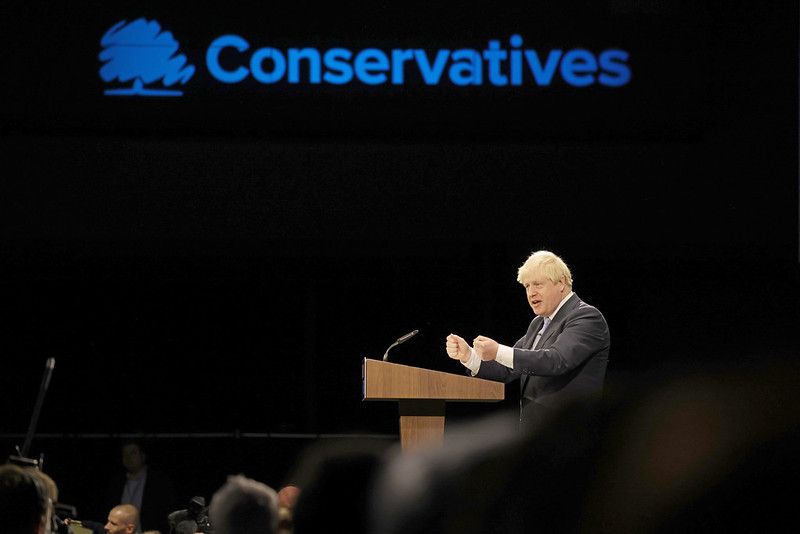The IOE&IT’s public affairs director, Paul O’Donnell, attended both the Conservative and Labour Party conferences in recent weeks and here highlights their contrasting approaches to international trade
The two main political party conferences made a return this year, after 2020’s Covid-induced hiatus.
With Labour decamping to Brighton (25-29 September) followed by the Conservatives’ migration to Manchester (3-6 October), the nation’s political class spent two weeks on trains, in overheated, under-ventilated rooms sharing plates of canapes and trusting to the God of Vaccines that all would be well.
As both parties have ageing demographics, the two gatherings were a little bit smaller than in previous years, with some members deciding that attending wasn’t for them.
Likewise corporate turnouts were down on previous years, reflecting a world in which business travel hasn’t quite kicked back into gear yet.
More buoyant
Overall, though, the feel of the two events was remarkably similar to that of previous years, in fact both were more buoyant than their 2018 or 2019 editions. These were both afflicted with spectacular levels of infighting in the shadow of (in the Conservative case) Brexit while for Labour, it was the decade-long civil war over the party’s overall direction.

Indeed, both conferences were minor key triumphs for the party leaderships. Prime Minister Boris Johnson was publicly unchallenged despite petrol queues, food shortages and having broken a Manifesto promise on tax rises just two weeks earlier.
The Leader of the Opposition, Sir Keir Starmer, was more obviously confronted by a section of his more left-wing activists.
However, he won most of the key votes over party rule book changes – always the most bitterly contested thing at a Labour Conference. The incoherent hecklers that took him on during his speech only served to draw attention to quite how peculiar the hard left looks to the rest of the country.
‘Good-humoured pragmatism’
Turning to trade, at the Conservative event there was a new Secretary of State to get to know.
Anne-Marie Trevelyan MP was a hard Brexiteer who has held several junior ministerial posts, including having already briefly been in Cabinet as the last Secretary of State for International Development.
She has spent the last year working on international climate diplomacy ahead of COP26. That role saw her recant some earlier positions that were sceptical about climate change and her good-humoured pragmatism seems likely to win her friends.
She will have a hard job making political capital out of international trade after her predecessor,Liz Truss, who turned the achievement of the 68 trade deals in the wake of Brexit into one of the signature successes of the current government.
Political stall
At an ‘in conversation’ event staged by ConservativeHome, which in contrast to her regulation five-minute address to Conference on Sunday 3 October, allowed her to set out her political stall, she acknowledged as much.
Trevelyan said that she sees her job as ‘DIT 2.0’ – less focussed on trade deals (at least after Australia and New Zealand are inked) and more on delivering incremental improvements on relationships around the globe, with support for exporters.
In the latter context she drew attention to the launch over the previous weekend of the new Export Support Service telephone advice line.
The big exception to seeking small wins around the world is the pursuit of the UK’s membership of Asian trade bloc CPTPP, although this has to be seen as much in a geopolitical context as an economic one.
Fairer trade focus for Labour
Her Labour Shadow, Emily Thornberry, has been in frontline politics a lot longer, with record stretching back to the Brown government.
The key issues in her portfolio at the moment are not actually about the facilitation of trade or how to do more of it. Rather, they are about how to make trade fairer, greener and, especially, more respectful of workers rights.
Those issues might have been characterised as peripheral only a few years ago, but they are increasingly salient in the public debate right now.
Cosmetic ruse?
The Labour Party’s contention that the government’s focus on trade deals has been a cosmetic ruse to make the Department for International Trade and its previous Secretary of State look successful is not wholly without merit.
However, it ignores the chaos that would have ensued in UK trading relationships around the world if those deals hadn’t been put in place.
Cross purposes
So, we are in an interesting position in which the two main parties are actually at cross purposes on how to approach trade.
Of course, there is common ground: for example on getting more SMEs to internationalise and, when push comes to shove, Labour would probably support UK accession to CPTPP.
But the language and priorities seem different. As the ructions of 2016-2020 recede into the distance, the arguments of the future may be a little less heated, but they are just as likely to be rooted in differing visions of how the UK should trade with the rest of the world.

